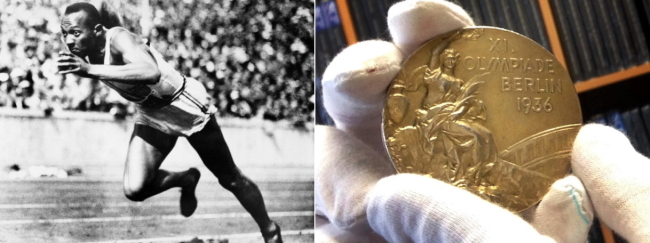
LAGUNA NIGUEL, California (AP) ― One of the four Olympic gold medals won by track and field star Jesse Owens at the 1936 Berlin Games is up for sale in an online auction that runs through Dec. 7.
The medal ― being auctioned online ― recalls both the Nazi propaganda myths that Owens busted with his world record-setting 100-yard dash, and the American segregation that he came home to when he returned to the U.S. after the Games, which Adolf Hitler orchestrated to showcase his ideas of Aryan supremacism.
“Almost single-handedly, Owens obliterated Hitler’s plans,” SCP Auctions partner Dan Imler said. “You’ve got an African American, son of a sharecropper, grandson of slaves who overcame these incredible circumstances and delivered a performance for the ages.”
The auction began Nov. 20 and closes Saturday. As of Monday, it had received 15 bids, with the highest at nearly $209,000, Imler said in an email.
“We expect a lot of bidding activity on the final day of the auction, which is typical,” he said.
Owens won gold in the 100- and 200-meters, the 400 relay and the long jump. But when he returned from the Berlin Games, he struggled to provide for his family.
His job options were limited by segregation and because he decided to return home instead of going on tour with the U.S. Olympic Team, he was stripped of his amateur athletic status.
“When they came back, the U.S. was just as it was when he left ― segregated. Even though he came back an Olympic hero, he wasn’t offered opportunities that Olympic heroes of today are offered,” said his daughter, Marlene Owens Rankin, 74, of Chicago. “We lived well, a middle class life. We didn’t want for much. But like many black men of that era, he struggled to provide for his family.”
The medal ― being auctioned online ― recalls both the Nazi propaganda myths that Owens busted with his world record-setting 100-yard dash, and the American segregation that he came home to when he returned to the U.S. after the Games, which Adolf Hitler orchestrated to showcase his ideas of Aryan supremacism.
“Almost single-handedly, Owens obliterated Hitler’s plans,” SCP Auctions partner Dan Imler said. “You’ve got an African American, son of a sharecropper, grandson of slaves who overcame these incredible circumstances and delivered a performance for the ages.”
The auction began Nov. 20 and closes Saturday. As of Monday, it had received 15 bids, with the highest at nearly $209,000, Imler said in an email.
“We expect a lot of bidding activity on the final day of the auction, which is typical,” he said.
Owens won gold in the 100- and 200-meters, the 400 relay and the long jump. But when he returned from the Berlin Games, he struggled to provide for his family.
His job options were limited by segregation and because he decided to return home instead of going on tour with the U.S. Olympic Team, he was stripped of his amateur athletic status.
“When they came back, the U.S. was just as it was when he left ― segregated. Even though he came back an Olympic hero, he wasn’t offered opportunities that Olympic heroes of today are offered,” said his daughter, Marlene Owens Rankin, 74, of Chicago. “We lived well, a middle class life. We didn’t want for much. But like many black men of that era, he struggled to provide for his family.”
-
Articles by Korea Herald


![[AtoZ into Korean mind] Humor in Korea: Navigating the line between what's funny and not](http://res.heraldm.com/phpwas/restmb_idxmake.php?idx=644&simg=/content/image/2024/04/22/20240422050642_0.jpg&u=)
![[Exclusive] Korean military set to ban iPhones over 'security' concerns](http://res.heraldm.com/phpwas/restmb_idxmake.php?idx=644&simg=/content/image/2024/04/23/20240423050599_0.jpg&u=20240423183955)



![[Graphic News] 77% of young Koreans still financially dependent](http://res.heraldm.com/phpwas/restmb_idxmake.php?idx=644&simg=/content/image/2024/04/22/20240422050762_0.gif&u=)
![[Herald Interview] Why Toss invited hackers to penetrate its system](http://res.heraldm.com/phpwas/restmb_idxmake.php?idx=644&simg=/content/image/2024/04/22/20240422050569_0.jpg&u=20240422150649)






![[Exclusive] Korean military to ban iPhones over security issues](http://res.heraldm.com/phpwas/restmb_idxmake.php?idx=652&simg=/content/image/2024/04/23/20240423050599_0.jpg&u=20240423183955)



![[Today’s K-pop] Ateez confirms US tour details](http://res.heraldm.com/phpwas/restmb_idxmake.php?idx=642&simg=/content/image/2024/04/23/20240423050700_0.jpg&u=)